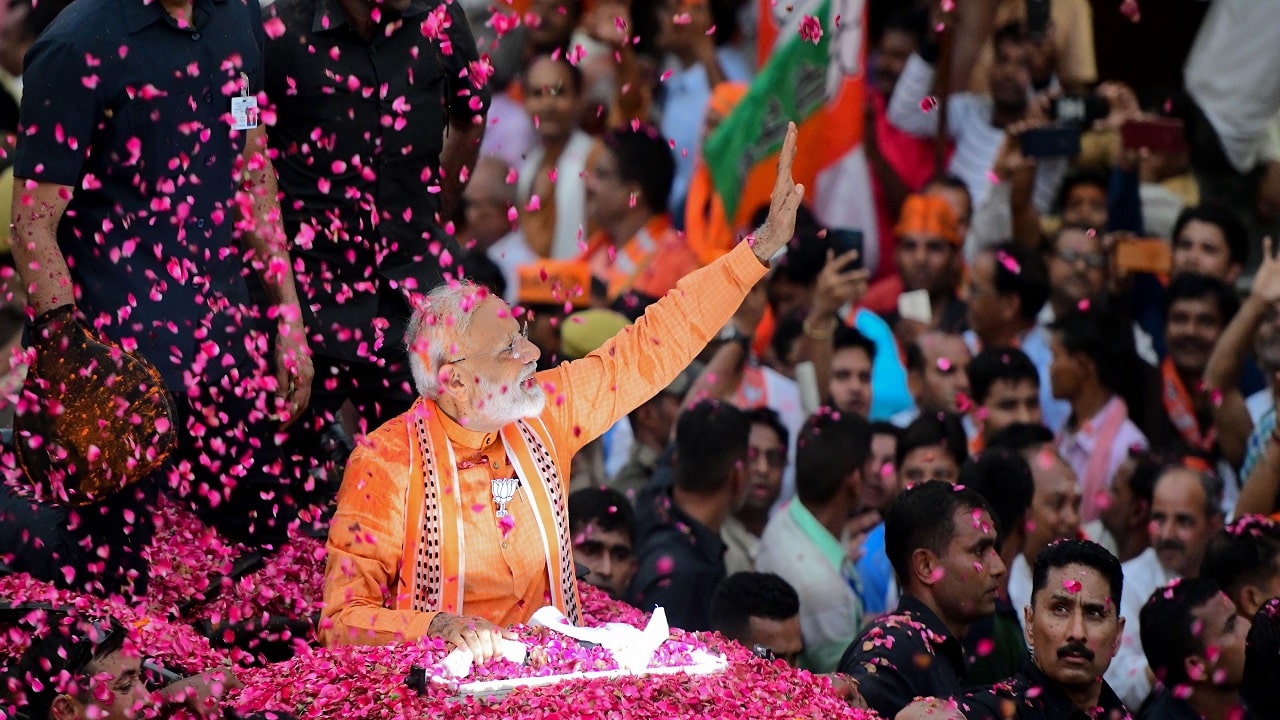
Annabel Bligh, The Conversation and Gemma Ware, The Conversation
After the world’s largest ever democratic exercise, Narendra Modi has been re-elected as prime minister of India for another five year term. His Bharatiya Janata Party (BJP) secured an even bigger majority than in 2014.
In this, the final part of our India Tomorrow series from The Anthill podcast, we analyse the results with a panel of academics to find out what such a large majority – of more than 300 seats – means for India.
Mujibur Rehman, assistant professor at the Centre for the Study of Social Exclusion and Inclusive Policy at Jamia Milia Islamia University in New Delhi, says the size of the victory has taken many analysts in the media by surprise.
The question is not about winning 300 seats, but the huge margin through which the BJP candidates defeated their nearest rivals … that is a huge, huge surprise.
Nikita Sud, associate professor of development studies at the University of Oxford, says the fact that Modi ran an almost presidential campaign, harks back to the slogans of the 1970s, when prime minister Indira Gandhi ran on the slogan, “Indira is India and India is Indira”.
It is to be commended on the part of the BJP that we are back to this very, person-centric politics where (in) every constituency people are talking about Modi … In 2014, people were testing him, but now that he’s a known entity, I think this personality-centricness can go both ways … because everything now centres even more on him, especially after this thumping victory.
The opposition Congress Party, suffered a crushing defeat at the polls, winning fewer than 50 seats and its leader Rahul Gandhi even lost his own parliamentary seat in Amethi, a traditional stronghold of India’s Nehru-Gandhi dynasty and the Congress in the northern Indian state of Uttar Pradesh. Rehman said the defeat was “massive” for Gandhi and the Congress party:
It signals that they are almost a non-entity today in the northern India politics, the heartland of Indian politics. Because he has a huge victory in (the southern state of) Kerala, but in the north they are almost a non-entity now.
Indrajit Roy, co-host of The Anthill’s India Tomorrow series and lecturer in politics at the University of York, says that while Modi’s victory is an example of populism, it also a victory for what he calls a “politics of passion”.
I think if you look at the results, you just look at the huge majorities that the BJP has won, not only at the country level, but in the constituencies that they’ve won … that’s not possible unless you’ve touched people’s hearts.
He stresses how different Modi’s journey to power is from that of US President Donald Trump, or Jair Bolsonaro, the newly elected president of Brazil – though he says there are similarities with Reccip Tayip Erdoğan, the president of Turkey.
Like Erdoğan, Modi very much belongs to the political system. He’s not an outsider. He was a chief minister of a state, he’s a fully fledged member of the party. He was groomed by the RSS [Rashtriya Swayamsevak Sangh], which is the ideological mentor of the BJP, so he’s very much a part and parcel of the political system. I do think that these elections were of course about Modi, but it was also about the ideas that Modi holds and that the ideas that he expressed, which is something which his party and the RSS have been working on for nearly 90 years – the ideas of India being a Hindu nation.

Subscribe to The Anthill podcast.
To find out more about the big issues facing India as Modi settles into his second term as prime minister, check out our episode guide for this series. Do get in touch with any questions via podcast@theconversation.com or reach out on Twitter @anthillpod.
Credits
The Anthill is produced by Gemma Ware and Annabel Bligh. Editing by Alex Portfelix. Thank you to City, University of London’s Department of Journalism for letting us use their studios to record The Anthill.
Picture source: BJP handout/EPA
Music: Flying Cat & Sitar by Tranko via Free Music Archive.
News clips:
India PM Modi wins landslide victory in world’s largest election, France 24
Election Results: Total BJP Sweep, India Chooses Modi 2.0, NDTV
Narendra Modi thanks voters for ‘historic mandate’, BBC News![]()
Annabel Bligh, Business + Economy Editor, The Conversation and Gemma Ware, Society Editor, The Conversation
This article is republished from The Conversation under a Creative Commons license. Read the original article.




25 Comments
Pingback: โปรแกรมพรีเมียร์ลีก
Pingback: ประตูไม้เทียม
Pingback: จำนำไอคราว
Pingback: Weather in Singapore
Pingback: Dan Helmer
Pingback: สล็อตเว็บตรง
Pingback: โคมไฟ
Pingback: ketamin
Pingback: runtz disposable vape pen
Pingback: https://stealthex.io
Pingback: visite aqui a pagina download do app
Pingback: SKY Wind
Pingback: LOTTOVIP
Pingback: บาคาร่าเกาหลี
Pingback: ตู้แช่แข็ง
Pingback: Free Music for Offline Listening
Pingback: happyluke
Pingback: rrc.lv
Pingback: vakantie
Pingback: plinko
Pingback: เว็บคาสิโน ออนไลน์ อันดับ 1
Pingback: สล็อตทดลองเล่นฟรีทุกค่าย คืออะไร ?
Pingback: Confirm168 เว็บหวยออนไลน์มาแรง จ่ายหนักบาทละ1,000/100
Pingback: web site
Pingback: endolift